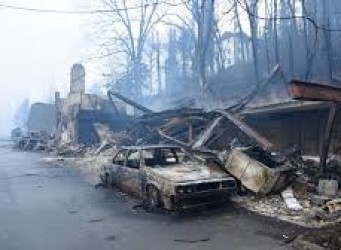The tangible consequences of climate change are occurring and no amount of denial is going to stop this. I posted about this recently and here’s another article about the same thing of how real estate values are being affected. People are becoming more and more aware of and sensitive to how the changes in climate are affecting our lives. When we consistently see on the news burned out and flooded communities and bigger and fiercer hurricanes behavior is changing. People are recognizing the risk and factoring that into decision making.
“Between 2007 and 2017, average home prices in areas facing the lowest risk of flooding, hurricanes and wildfires have far outpaced those with the greatest risk.”
“the threats of climate change are beginning to register.”
“home buyers have to weigh the risk of disasters against the so-called amenity value of living near water or at the edge of the forest”
“the interaction between climate change and the housing market… is increasing as more Americans live through storms, floods or wildfires.”
Climate Change May Already Be Hitting the Housing Market
By Christopher Flavelle and Allison McCartney
June 18, 2018
Even as President Donald Trump downplays the importance of climate change, there are signs that Americans may be taking it more seriously—at least when it comes to buying a house.
Between 2007 and 2017, average home prices in areas facing the lowest risk of flooding, hurricanes and wildfires have far outpaced those with the greatest risk, according to figures compiled for Bloomberg News by Attom Data Solutions, a curator of national property data. Homes in areas most exposed to flood and hurricane risk were worth less last year, on average, than a decade earlier.Attom Data looked at the annual change in home prices and sales across 3,397 cities around the country, then divided those cities into five groups based on their exposure to various types of natural disasters. What they found suggests the threats of climate change are beginning to register.
On average, home prices across the cities analyzed by Attom Data increased 7.3 percent between 2007 and 2017. That figure masks deep drops in vulnerable areas.
Attom Data looked at the annual change in home prices and sales across 3,397 cities around the country, then divided those cities into five groups based on their exposure to various types of natural disasters. What they found suggests the threats of climate change are beginning to register.
“Natural disaster risk is certainly not the only factor consumers are considering when buying a home,” said Daren Blomquist, Attom Data’s senior vice president for communications. But he said the figures provide “some evidence real estate consumers are responding to natural disaster risk, albeit somewhat erratically.”
The data suggest the relationship between climate risk and home prices isn’t always a straight line. That’s because home buyers have to weigh the risk of disasters against the so-called amenity value of living near water or at the edge of the forest, according to Carolyn Kousky, director for policy research for the Risk Management and Decision Processes Center at the Wharton School.
“It’s probably very likely that people are starting to have a greater awareness of disaster risk,” Kousky said. “The tricky part is that some of the riskiest areas are also such high amenities.”
For example, home values in Key Biscayne, Florida were 19 percent higher in 2017 than in 2007, despite the island’s flood risk. Homes in Aromas, California, which Attom Data classifies as a very high wildfire risk, increased 43 percent over the same period. Both areas offer natural beauty that buyers have apparently concluded is worth the danger.
But the data suggest those areas are becoming the exception. Another string of disasters might speed the process. Jesse Keenan, who teaches at Harvard University and focuses on the interaction between climate change and the housing market, said that connection is increasing as more Americans live through storms, floods or wildfires.
“People have actually observed these phenomena,” Keenan said. “There’s been a lot of recent experience.”
Asaf Bernstein, a professor at the University of Colorado at Boulder who has studied the drop in home prices associated with sea-level rise, said it’s not surprising that home values would be affected by other types of climate risk.
“It’s not a question of if,” Bernstein said. “It’s a question of when.”



